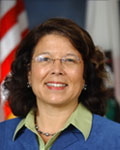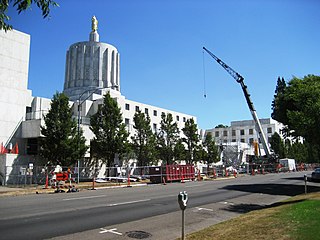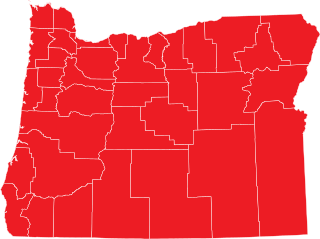Related Research Articles

The Colorado General Assembly is the state legislature of the State of Colorado. It is a bicameral legislature that was created by the 1876 state constitution. Its statutes are codified in the Colorado Revised Statutes (C.R.S.). The session laws are published in the Session Laws of Colorado.
In the politics of the United States, the process of initiatives and referendums allow citizens of many U.S. states to place new legislation, or to place legislation that has recently been passed by a legislature on a ballot for a popular vote. Initiatives and referendums, along with recall elections and popular primary elections, are signature reforms of the Progressive Era; they are written into several state constitutions, particularly in the West. It is a form of direct democracy.

Lori R. Saldaña is an American politician from San Diego, California. She is a former member of the California State Assembly from the 76th Assembly district. She served from 2004 to 2010, when term limits prevented her from seeking re-election. She served as a Democrat.

The Oregon Medical Marijuana Act, a law in the U.S. state of Oregon, was established by Oregon Ballot Measure 67 in 1998, passing with 54.6% support. It modified state law to allow the cultivation, possession, and use of marijuana by doctor recommendation for patients with certain medical conditions. The Act does not affect federal law, which still prohibits the cultivation and possession of marijuana.

The Utah State Legislature is the state legislature of the U.S. state of Utah. It is a bicameral body, comprising the Utah House of Representatives, with 75 state representatives, and the Utah Senate, with 29 state senators. There are no term limits for either chamber.
A nonpartisan blanket primary is a primary election in which all candidates for the same elected office run against each other at once, regardless of the political party. Partisan elections are, on the other hand, segregated by political party. Nonpartisan blank primaries are functionally identical to the two-round system, with the caveat that the first round is officially the "primary." Round two is the "general election." Round two must be held, even if one candidate receives a majority in the first round.
The so-called Louisiana primary is the common term for top-two runoff system used in the Louisiana general election for local, state, and congressional offices, though strictly speaking it does not involve a primary election before the general election. On election day, all candidates for the same office appear together on the ballot, often including several candidates from each major party. The candidate who receives a simple majority is elected. If no candidate wins a simple majority in the first round, there is a runoff one month later between the top two candidates to determine the winner. This system is also used for United States Senate special elections in Mississippi and Texas, and all special elections for partisan offices in Georgia. It is also used for municipal elections in Portland, Oregon, and Chicago, Illinois.

Norma Jean Paulus was an American lawyer and politician in the state of Oregon. A native of Nebraska, she was raised in Eastern Oregon before becoming a lawyer. A Republican, she first held political office as a representative in the Oregon House of Representatives, and then became the first woman elected to statewide public office in Oregon when she became Oregon Secretary of State in 1977. Paulus later served as Oregon Superintendent of Public Instruction for nine years. She made unsuccessful bids to become Governor of Oregon and United States Senator. Prior to her death on February 28, 2019, Paulus lived in Portland, where she was involved with several non-profit groups and sponsored a ballot measure to create open primaries in Oregon's statewide elections.
Phil Keisling is a politician and business executive in the U.S. state of Oregon. He served as Oregon Secretary of State from 1991 to 1999 and previously served in the Oregon House of Representatives. He is known for having championed the state's vote-by-mail system.
The Independent Party of Oregon (IPO) is a political party in the U.S. state of Oregon with more than 135,000 registrants since its inception in January 2007. The IPO is Oregon's third-largest political party and the first political party other than the Democrats or Republicans to be recognized by the state of Oregon as a major political party.

Electoral reform in California refers to efforts to change election and voting laws in the U.S. state of California.

Elections in Oregon are all held using a Vote by Mail (VBM) system. This means that all registered voters receive their ballots via postal delivery and can vote from their homes. A state Voters’ Pamphlet is mailed to every household in Oregon about three weeks before each statewide election. It includes information about each measure and candidate in the upcoming election.
Larry George is an American politician and businessman in Oregon. He was a Republican member of the Oregon State Senate representing District 13 from 2007 to 2015. Before his election, he was the leader of the political group Oregonians In Action. He is part of the second father-son tandem to serve in the Oregon Senate.

Virginia Burdick is an American politician from the U.S. state of Oregon, serving her seventh term in the Oregon State Senate. She represents Tigard and Southwest Portland in Senate District 18.

The Seventy-fourth Oregon Legislative Assembly was the Oregon Legislative Assembly (OLA)'s period from 2007 to 2008. There was a regular session in 2007, and a shorter special session in 2008.

The 75th Oregon Legislative Assembly convened beginning on January 12, 2009, for its biennial regular session. All of the 60 seats in the House of Representatives and half of the 30 seats in the State Senate were up for election in 2008; the general election for those seats took place on November 4.

Ballot Measure 65 was an initiated state statute ballot measure for the November 4, 2008 general election ballot in the state of Oregon. If it had passed, it would have replaced the current closed primary election system for partisan offices, in which each political party nominates its own candidate for the general election. The system proposed by Measure 65 bore similarities to a blanket primary and nonpartisan blanket primary.
Electoral reform in Oregon refers to efforts to change election and voting laws in the West Coast state of Oregon.
The New Jersey Election Law Revision Commission (ELRC) was a bipartisan panel established in 1964 to review all of the state's election laws and recommend ways to modernize them. New Jersey's election laws had not been overhauled since 1930. The ELRC eventually produced (1) an Initial Report in 1965 recommending the elimination of paper ballots, (2) an Interim Report in 1970 recommending reforms for campaign finance laws, and (3) a Final Report in 1975 recommending a comprehensive set of reforms to curb corruption by reducing complexity and centralizing oversight under an independent, bipartisan agency. Faced with political fallout from Watergate in 1974 and the conviction of several officials in NJ Governor William T. Cahill's administration in 1973, lawmakers reformed NJ's campaign finance laws, drawing on the 1970 Interim Report recommendations. However, when the Final Report's broader recommendations for modernizing the state's election laws were introduced in the General Assembly on April 21, 1975; lawmakers took no action. The bill failed to clear committee.
References
- ↑ "Archived copy" (PDF). www.leg.state.or.us. Archived from the original (PDF) on 11 October 2006. Retrieved 12 January 2022.CS1 maint: archived copy as title (link)
- ↑ "Archived copy" (PDF). Archived from the original (PDF) on 2006-10-05. Retrieved 2008-10-04.CS1 maint: archived copy as title (link)
- ↑ Database of bills Archived 2011-01-10 at the Wayback Machine from the Oregon legislature's web site. Retrieved October 6, 2008.
- ↑ Official web page Archived 2007-12-14 at the Wayback Machine on the Oregon Legislature's web site
- ↑ Complete report Archived 2008-10-09 at the Wayback Machine of the PCOL
- ↑ Keisling, Phil; Norma Paulus (April 13, 2008). "Reviving Oregon elections: Let's make primaries truly open, inclusive and fair". The Oregonian.
- ↑ "How not to win public trust". The Bulletin. October 24, 2006.
- ↑ Recommendations section Archived 2010-12-06 at the Wayback Machine of the PCOL report